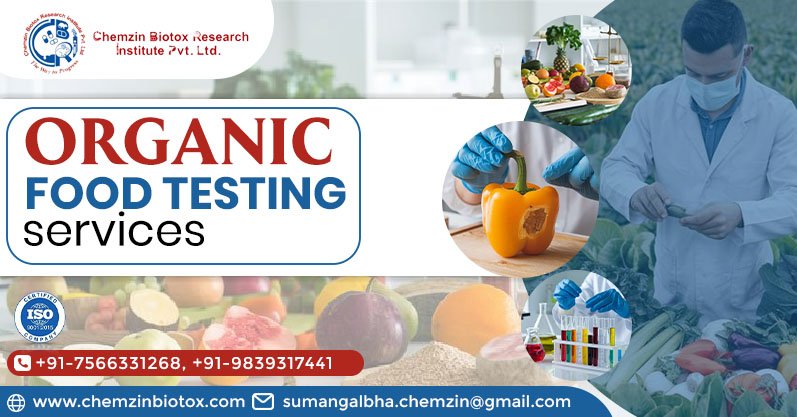Organic Food Testing Services: India stands among the top three in the world when it comes to the production of organic foods. With a land base exceeding 4.6 million hectares for organic cultivation and with an excess of 1.9 million organic farmers registered. The structure of India’s agribusiness is changing dramatically. Even in the home market, the Indian organic food business is flourishing. Hence, it was at the figure of ₹11,300 crore and is projected to have a growth of 20.5% CAGR for the next five years. This is where organic food testing services come in. For the entire organic agricultural-to-consumer value chain, they serve as a lifeline.
Chemzin Biotox Research Institute Pvt. Ltd. is one such leader here, which has been helping out the small as well as large-scale farmers/firms in ensuring purity and safety.
Why are organic food testing services more important than ever?
- With more and more people switching to natural, unprocessed food, demand for organic has skyrocketed in Indian metros and Tier-2 cities as well. But just because a product bears the tag “organic” does not necessarily mean that it is. Without a test and verification system, the tag is useless.
- Furthermore, this requirement is satisfied by the trustworthy Organic food testing laboratory. Hence, these laboratory testing services for organic food use scientific methods to identify over 200 pesticide residue types, heavy metals like arsenic and lead, and GMO traces.
- For instance, a truckload of organic wheat may still contain pesticide residues if the neighboring farms apply pesticides. Moreover, such testing allows farmers to take precautions and maintain genuine organic standards.
- Regulations-wise, India has its NPOP (National Programme for Organic Production) that requires periodic testing for certification. Without certified lab reports, a farmer or brand cannot sell its produce as “organic” in domestic or export markets.
- .On the other hand, it connects sellers, buyers, and producers with quality assurance. Whether it’s a packet of organic basmati rice in Mumbai or a carton of organic mangoes shipped to Germany, organic food testing services guarantee that what ends up on the plate is clean, safe, and authentic.
How does an Organic food testing laboratory check for food purity?
Organic food testing is not a one-test. Here are some important points to consider:
Detecting pesticide residue
India employs more than 45 synthetic types of pesticides in regular agriculture. Tiny amounts are enough in organic produce to lead to certification failure. However, the laboratory analysis is conducted with tools such as GC-MS (Gas Chromatography-Mass Spectrometry). Plus, the process detects chemical residues at parts-per-billion (ppb) levels.
Check for heavy metals
Mercury, lead, arsenic, and cadmium contamination is prevalent because of irrigation water and soil contamination. Laboratory analysis of these metals is conducted through ICP-MS (Inductively Coupled Plasma Mass Spectrometry). Every batch of food is analyzed by a genuine organic food test laboratory to ensure consumer health and soil health. Anything in excess not only damages health but also deteriorates the quality of farms in the long run.
Screening for GMOs
India bans GMOs in organic farming. There is, however, accidental contamination through seeds or wind. To avoid this, laboratories test through PCR (Polymerase Chain Reaction). The product is not certified once detected. Laboratory testing services for organic food guarantee that the end product is 100% GMO-free.
Why does every organic farmer in India need testing support?
- Over 60% of Indian farmers continue to farm the conventional way. But that is insufficient in today’s global market. For farmers, testing provides access to premium prices. An organic product will command a 20-40% premium over normal ones. Through the services of organic food testing, they are able to guarantee their food is clean.
- Exporters also depend a lot on the organic food testing laboratory. The EU, USA, and Japan are also strict importers. Indian products can be rejected without lab reports. Chemzin Biotox Research Institute Pvt. Ltd. provides such essential services. Their testing enables Indian as well as foreign safety standards. Most importantly, testing enforces clean farming. It compels each actor in the value chain to comply.
Final Thoughts
India’s organic revolution requires a foundation. Verification produces trust, which is a foundation. Organic food testing services render the food you consume safe, authentic, and chemical-free. Moreover, they supply the domestic and export markets with credible information. With demand increasing and international interest, the role of the testing labs is more important than ever before. Whether pesticide testing, GMO testing, or metal testing, lab activity means sustainable agriculture on the ground.
Contact Us
Company Name: Chemzin Biotox
Address: 1st Floor, Plot No-94,
Ind.Area Phase 1, Jharmajri EPIP,
Solan, Himachal Pradesh, 174103
Phone No.: +91-7566331268, +91-9839317441
Email Id: sumangalbha.chemzin@gmail.com
Frequently Asked Questions
Q.1 What happens if a food sample fails organic testing?
Ans. If the sample contains pesticides or heavy metals, it’s not certified organic. The producer or farmer must clean the sample before it’s retested.
Q.2 Can organic food contain any chemicals at all?
Ans. It is environmentally feasible to have exposure to trace levels but under highly controlled conditions. Testing is employed to ensure such levels are at a safe level.
Q.3 Is organic food testing expensive for small farmers?
Ans. Most laboratories offer affordable packages. Chemzin Biotox Research Institute Pvt. Ltd. also offers support to farmer cooperatives and associations with bulk testing at discounted rates.

